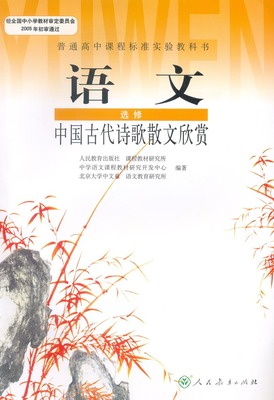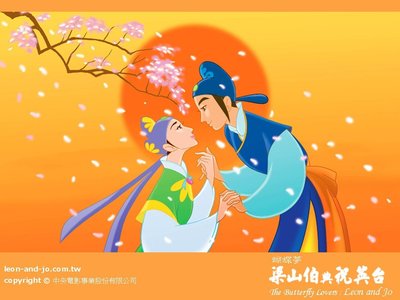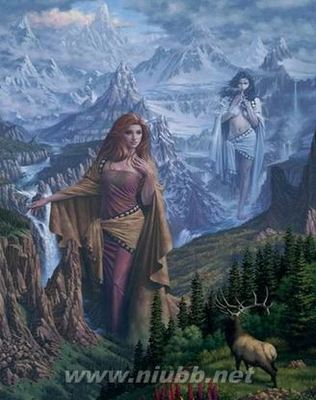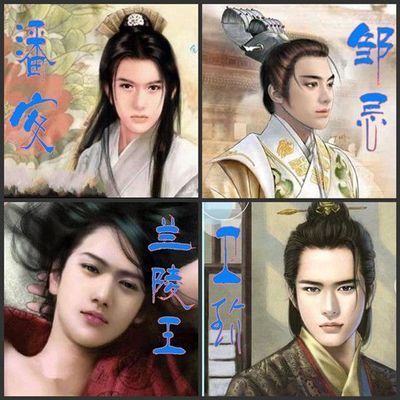英译汉部分
Translated by Bi hóng(毕谹[hong])
(1)ToEletra 有赠
RobertHerrick (1591-1674) 罗伯特·赫里克
赫里克性豪放,不拘拘于绳墨。而衣食驱人,去南杜文郡任教区牧师,日以宣扬教义为事,遂终老于是乡。然究其内心,未尝不神驰于美人鱼酒店中之高谈纵论时也。赫里克终身未娶。乡园寥廓,居尝与豕羊为邻,鸡鹅作侣。时复徜徉(changyang)于山水之间,与大自然狎。挹(yi)其生趣,发为小诗,颇清婉可诵。若《折蕊辞》与《有赠》,皆其选也。赫氏集中亦多精雕细镂之作。人或私议之曰:此乃氏早年尝从事于制作金饰之故,则谑而虐矣。
I dare not ask akiss,不敢吻朱唇,
I dare not beg asmile,不敢乞浅笑,
Lest having that, orthis,但恐笑吻后,
I might grow proud thewhile. 我心生怠傲。
No, no, the utmostshare我心无奢求,
Of my desire shallbe至多只一缕:
Only to kiss thatair愿言吻轻风,
That lately kissedthee.轻风甫吻汝。
译后记:情而入痴,每涉痴想。所愿或差近事理,或纯属幻念。然其出诸衷肠,源于心灵则一也。
(2) LoveSongs情歌
Robert Burns(1759-1796) 罗伯特·彭斯
凡民间歌谣,辄为感于哀乐,缘事而发,出于肺腑,动人心魄。其言儿女之情者,奔放坦率,绝无隐饰,如汉乐府歌辞《上邪》云:“上邪!我欲与君相知,长命无绝衰。山无陵,江水为竭,冬雷震震,夏雨雪,天地合,乃敢与君绝!”何其坚决乃尔!彭斯《我爱》一诗,源于民歌,故其真挚热烈,亦仿佛似之也。彭斯者,苏格兰农家子。苏格兰故为歌谣之乡,彭斯常撷其菁华,予以整理,或据原本而进行改写,或依旧曲而自制新词。注重声韵,善用方言。且关心时政,抨击邪恶;宣扬民主,鼓吹独立;又不仅若《我爱》之专尚爱情而已也。是篇曼殊上人昔曾译以五言。其后以新体重译者,不一而足,且有佳构。余稿为早年试笔,原应弃置。今乃仍予录存,诚如《典论·论文》所谓“家有敝帚,亨之千金”者矣。彭斯又有情诗曰《吉恩》,亦复韵致缠绵,感情强烈,语简而意长,因一并译之。
A. MyLuve我爱(毕谹译)(袁可嘉 译 孙梁 校)
O my Luve’s like a red, redrose我爱如玫瑰,啊,我爱人象红红的玫瑰,
That’s newly sprung inJune:六月红蕾姣。在六月里苞放;
O my Luve’s like themelodie我爱如乐曲,啊,我爱人象一支乐曲,
That’s sweetly play’d intune.妙奏声袅袅。乐声美妙、悠扬。
A Red,RedRose一朵红红的玫瑰
As fair art thou, my bonnielass,爱卿无限深,你那么美,漂亮的姑娘,
So deep in luve amI:如卿绝世妍。我爱你那么深切;
And I will luve thee still, mydear,直至海水枯,我会永远爱你,亲爱的,
Till a’ the seas gangdry:此爱永绵绵。一直到四海涸竭。
Till a’the seas gang dry, mydear,直至海水枯,直到四海涸竭,亲爱的,
And the rocks melt wi’thesun;炎阳熔岩石。直到太阳把岩石消熔!
I will luve thee still, mydear,但教一息存,我会永远爱你,亲爱的,
While the sands o’life shallrun.爱卿无终极。只要生命无穷。
And fare thee weel, my onlyLuve!离别只暂时,再见吧,我唯一的爱人,
And fare thee weel awhile!善保千金躯。再见吧,小别片刻!
And I will come again, myLuve,终当复归来,我会回来的,我的爱人,
Tho’ it were ten thousandmile.万里度若飞。即使万里相隔!
B.Jean吉恩
Of a’the airts the wind can blaw
I dearly like the West,
For there the bonnie lassie lives,
The lassie I lo’e best:
There’s wild woods grow, and rivers row,
And mony a hill between;
But day and night my fancy’sflight
Is ever wi’ my Jean.
清风四面来,我最爱西方。
西方有佳人,情深不能忘。
林密河流广,连绵隔重冈。
心魂日夜驰,长在吉恩旁。
I see her in the dewy flowers,
I see her sweet and fair:
I hear her in thetunefu’birds,
I hear her charm the air:
There’s not a bonnie flower thatsprings
But by fountain, shaw, or green,
There’not a bonnie bird thatsings
But minds me o’my Jean.
露滴芳蕊开,见伊容色鲜。
春禽婉转啼,闻伊歌缠绵。
清泉流汩汩,树丛草芊芊。(qian)
花香鸟语处,总念吉恩妍。
译后记:情诗之源自民间者,常直而近,出于文士者,多婉而深,中外皆然。
(3)I Travell’d Among UnknownMen
独在异乡为异客
I Travell’d among unknown men
In lands beyond the sea;
独在异乡为异客,茫茫人海寄浮萍。
Nor, England did I know till then
What love I bore to thee.
此时方识家山好,祖国一声无限情。
’Tis past, that melancholy dream!
Nor will I quit thy shore
旧梦已逝勿复论,悲怀遣尽爱心存。
A second time; for still I seem
To love thee more and more.
海滨不再轻离别,倍觉可亲是国门。
Among thy mountains did I feel
The joy of my desire;
磴绕山环记此家,个中岁月乐无涯。
And she I cherish’d turn’d her wheel
Beside an English fire.
炉边坐傍故园火,心上伊人摇纺车。
Thy mornings show’d, thy nights conceal’d
The bowers where Lucy play’d;
暮霭朝霞掩复开,回光空照旧楼台。
And thine too is the last greenfield
That Lucy’s eyes survey’d.
伤心原上青青草,曾伺芳卿一顾来。
(4) On His Seventy-fifth Birthday述怀
Walter savage Landor (1775-1864) 沃尔特·萨维奇·兰多
世传兰多性褊(bian)急,辄与人忤,而所遇亦辄左。家本富裕,因鬻(yu;卖)祖产得巨赀,乃以争讼及挥霍,遂尽丧其所有。旋复为其子女所摈,愤而索居于埃文郡之巴斯,凡二十余载,至时赖挚友勃郎宁之周济以生。晚岁以避讼事,远走意大利而卒。兰多有文名,不以诗著,然其抒情之作,亦颇有足取者,是诗为其耄年自寿之什,称述好尚,故示闲适。然仍好用争字,虽言不争,似犹未能忘情于争也。
I strove with none, for none was worth my strife;
Nature I loved, and, next to Nature, Art;
与人无所争,谁堪与我伦。
自然心所爱,艺术亦可亲。
I warmed both hands before the fire oflife;
It sinks, and I am ready to depart.
面对生命火,双手暖如春。
火冷我将逝,怡然谢世尘。
(6)She Is Not Fair to OutwardView 伊人
HartleyColeridge (1796-1849)哈特利·柯尔律治
作者为湖畔诗人塞缪尔·泰勒·柯尔律治之长子,亦善诗如其父而风格殊不类。其十四行诗奔放不羁,以此著称。然富于才而未能慎于行。尝以放浪失牛津大学奖学金,至不克竟其业。为杂志撰稿,亦以无恒心而无以自显,回乡郁郁而殁。其诗只零星见于选本,亦良可慨矣。
She is not fair to outwardview伊人初睹非殊色,
As many maidensbe;未如众女逞婵娟。
Her loveliness I neverknew可人怜处不曾识,
Until she smiled onme.直至顾我一嫣然。
O then I saw her eye wasbright,方觉双睛明熠熠,
A well of love, a spring oflight.是光之源爱之渊。
But now her looks are coy andcold, 而今眼波何冷怯,
To mine they ne’erreply,千番注目不回报。
And yet I cease not tobehold却见星眸深深处,
The love-light in hereye:爱意仍然光四照。
Her very frowns are fairerfar纵教双蛾含颦锁,
Than smiles of other maidensare.绝胜众女开颜笑。
(7)Poems onSlavery奴役篇
HenryWadsworth Longfellow (1807-1882)亨利·沃兹沃斯·朗费罗
世有以朗费罗比于白傅者。其言曰:“多产一也,老妪都解二也。白氏赋《春草》云:‘野火烧不尽,春风吹又生。’而朗费罗之《人生颂》则曰:‘时往沙迹在,人去足痕留。’俱有生生不息,薪尽火传之意。虽二人诗论迥异,一主诗歌合为时而作,一言宜以愉悦、鼓舞、教导为先。然朗氏之《奴役篇》七首,抨击时弊,力主废奴,是亦《新乐府》之流亚也。”凡所列举,不无可取。盖我人激扬文字,月旦人物,固不宜以偏盖全,亦不妨求同存异。质之识者,未审以为然否?
2 The QuadroonGirl混血女
The Slaver in the broadlagoon奴贩泊舟处,
Lay moored with idlesail;礁湖水浩荡。
He waited for the risingmoon正待晚风来,
And for the eveninggale.天际皓月上。
Under the shore his boat wastied,舟泊礁湖边,
And all her listlesscrew水手懒无力。
Watched the gray alligatorslide目送灰色鳄,
Into the stillbayou.游入沼口侧。
Odours of orange-flowers andspice橙花杂椒花,
Reached them from time totime,香气阵阵至。
Like the airs that breathing fromParadise有如天国风,
Upon a world ofcrime.吹来万恶地。
The Planter, under his roof ofthatch,茅舍农场主,
Smoked thoughtfully andslow;拈烟心犹豫。
The Slaver’s thumb was on thelatch,奴贩抚门键,
He seemed in haste togo.似欲匆匆去。
He said, “My ship at anchorrides口言礁湖上,
In yonder broadlagoon;我舟正停泊。
I only wait the eveningtides但候夜潮生,
And the rising of themoon.”云端见浩魄。
Before them, with her faceupraised,眼前混血女,
In timidattitude,仰面亭亭立。
Like one half curious, halfamazed,楚楚剧可怜,
A Quadroon maidenstood.惊奇又羞涩。
Her eyes were large and full oflight,星眸生光辉,
Her arms and neck werebare;袒露颈与臂。
No garment she wore save a kirtlebright,罗裙色鲜明,
And her own long, ravenhair.秀发长委地。
And on her lips there played asmile笑意含芳唇,
As holy, meek, andfaint,圣洁孰堪比?
As lights in some cathedralaisle灿灿教堂灯,
The features of asaint.盈盈天仙子。
“The soil is barren,——the farm isold;”地老田已荒,
The thoughtful Plantersaid;场主暗自语。
Then looked upon the Slaver’sgold,一顾奴贩金,
And then upon themaid.再顾身旁女。
His heart within him was atstrife面临不义财,
With such accursedgains;胸中争持烈。
For he knew whose passions gave herlife,心知女谁生,
Whose blood ran in herveins.女脉流谁血。
But the voice of nature was tooweak;天性声过微,
He took the glitteringgold!手攫黄金起。
Then pale as death grew the maiden’scheek;女手冷如冰,
Her hands as icycold.双颊白似纸。
The Slaver led her from thedoor,奴贩执女手,
He led her by thehand,步出大门口。
To be his slave andparamour迢迢走异乡,
In a strange and distantland!为奴为情妇。
(8)The Rubaiyat of Omar khayyam (Extract)莪默·伽亚谟作《鲁拜集》(节选)
EdwardFitzGerald (1809-1883) 爱德华·菲茨杰拉德
莪默·伽亚谟为波斯诗人,其《鲁拜集》成于十一世纪之始,初未为人所识也。至十九世纪中叶,英诗人菲茨杰拉德以清新隽永之笔译之,遂大著于世。伽亚谟所著诗,大致以天地为逆旅,视人物如过客;悼年命之不长,伤欢乐之易逝;敝屐荣华,蔑弃圣哲;纵情诗酒,感怀古今;其中不乏与李白《春夜宴桃李园序》开端数语,有近似之处。而情辞沉郁,韵味悠长,出自胸臆,萦人心肺,则作者与英译者之功力,均不可忽也。余之所译,于词句颇致力于声韵。倘稍有可取,则唯此而已,言之殊可恧(nǜ;羞惭)焉。
20
Ah, my Beloved, fill the Cup thatclears美酒芳卿酌满瓯,
To-day of past Regret and futureFears:为侬消却古今愁。
To-morrow!——Why, To-morrow I maybe此身明日知何处?
Myself with Yesterday’s Sev’n thousandYears.大限如临土一丘。
28
With them the seed of Wisdom did Isow,学种智慧树,
And with mine own hand wrought to make itgrow;枝叶看葱茏。
And this was all the Harvest that I reap’d——所得知何似?
“I came like Water, and like Wind Igo.”如水复如风。
49
But helpless Pierces of the Game Heplays昼夜一棋局,
Upon this Chequer-board of Nights andDays:我侪皆棋子。
Hither and thither moves, and checks, andslays,摆布由造化,
And one by one back in the Closetlays.局终归匣里。
52
And that inverted Bowl they call theSky,穹宇四垂如覆盆,
Whereunder crawling coop’d we live anddie,众生扰攘个中存。
Lift not your hands to It for help —— forIt且休膜拜求天助,
As impotently moves as you orI.天亦徒劳似我人。
(9) TheEagle鹰
AlfredTennyson (1809-1892) 艾尔弗泪德·丁尼生
鹰为鸷(zhi;凶猛)禽,威武冠于羽类,我国诗人常喜言之。杜老尝有《姜楚公话鱼鹰》诗云:“素练风霜起,苍鹰画作殊。扌双身思狡兔,侧目似愁胡。绦镟光堪摘,楹轩势欲呼。何当击凡鸟,毛血洒平芜。”状画上之鹰,呼之欲出。西人咏鹰之作,虽有而不多。丁尼生此什,貌其桀骜之态,乃有横绝四海,顾盼生风之致,亦复不同凡响。原诗六行,因以浣溪沙译之。
He clasps the crag with crookedhands;铁爪如钩扼险磴,
Close to the sun in lonelylands,屹然独立近朝暾(tun;太阳),
Ring’d with the azure world, he stands.四围天色碧无垠。
The wrinkled sea beneath himcrawls;身下层涛来淼淼,
He watches from his mountainwalls,岩端巨眼视瞵瞵,
And like a thunderbolt hefalls.迅如霹雳下青云。
(10)Alligoric Poems讽谕诗
Emily Dickinson (1830-1886)艾米莉·狄金森
狄金森耽于诗而不欲求知于人,故人亦鲜有知之者。迨及身后,全集既行,声誉日著,衡以诗人之本性,或非其初衷也。狄金森离群索居,涉世不深,与世无争,然以冷眼观世事,每能察秋毫之末。发为短章,遂乃鞭辟入里。如下列二篇,或刺溺于自炫之辈,不惜陷身泥淖。或伤献身美与真理之士,赍(ji;怀、抱)志以殁,终其生而湮没不彰。寻其旨趣,亦讽喻诗之流亚也。特表而出之,以见诗人于探索人生与大自然之奥秘而外,固未尝忘情于社会,而其诗歌亦不仅以超乎象外之意境见长而已也。
1
I’mNobody我乃无名辈
I’m nobody, who areyou?我乃无名辈,借问君为谁?
Are you nobodytoo?君亦少声誉?彼此一样卑。
Then there’s a pair ofus.心照慎勿宣,我侪众人欺。
Don’t tell —— they’d banish us, you know.
How dreary to besomebody,一旦为名人,无聊怎可耐。
How public — like a frog—所慕在泥沼,有如青蛙辈。
To tell your name the lifelongJune长夏无休歇,自吹复自擂。
To an admiring bog.(泥塘,沼泽)
2
I Died for Beauty
I died for Beauty —— but wasscarce
Adjusted in the Tomb
When One who died for Truth, waslain
In an adjoiningRoom
我为美亡身,入土未移晷。(gui,日影,比喻时光;古代测日影的仪器)
复有后来者,乃为真理死。
同在墓穴中,两室正相迩。
He questioned softly “Why I failed”?
“For Beauty”, I replied
“And I —— for Truth
Themselves are one
We Brethren, are”, He said
低声问死因,我道只为美。
彼言我亦然,捐躯为真理。
二者本无殊,我侪乃兄弟。
And so, as Kinsmen, met a Night
We talked between the Rooms
Until the Moss had reached our lips
And covered up our names
夜台逢亲人,隔室话不止。
直至苔藓生,迤俪遍墓底。
封却唇与吻,复去名和氏。
(11)Rain雨
Robert LouisStevenson (1850-1894)罗伯特·路易斯·史蒂文生
史蒂文生与威廉·亨利为知交。亨利尝论之曰:“史氏深于情,亦耽于欲。其喜也,如《暴风雨》中之精灵;其哀也,似《哈孟雷特》中之王子;惯于恶作剧,仿佛《仲夏夜之梦》中之顽童;而有时又俨然一加尔文教堂中之教士。”如此则史氏诚奇人矣。史氏人奇书亦奇。若《宝岛》上之海盗,性暴而心慈;《化身博士》内之医生,昼善而夜恶。人物跃然纸上,情节诡谲可喜,宜其能脍炙人口也。至其《儿童诗园》,追咏儿时之印象与感情,极为真挚动人,乃诗歌中别开生面之作。兹译其二首,一为《献给母亲》,一即此诗。试用六言,以备一格。
The rain is raining all around,
It falls on field and tree,
It rains on the umbrellas here,
And on the ships at sea.
处处纷纷雨点,蒙蒙树杪田边。(miao; 树梢)
飘落此间伞顶,飞随海上航船。
(12)Pictures in the Fire(Extract)炉中图景
Robert Louis Stevenson (1850-1894) 罗伯特·路易斯·史蒂文生
余之以古今体诗译西诗,至史蒂文生之咏《雨》而自五言至七言已俱备矣。词可存者二首,惟曲则尚付阙如。因取史氏《炉中图景》一篇,摘其首章,译为散曲,以备一格。意近而辞拙,于作者殊有愧焉。
The lamps now glitter down the street:
Faintly sound the falling feet;
And the blue evening slowly falls
About the garden trees and walls.
[凭阑人] 闪烁街灯点点明,零落步声渐渐轻。园柯与壁瓴(ling; 盛水的瓶子),苍烟冥冥萦。
(13)When You AreOld 当汝年老时
WilliamButler Yeats (1865-1939) 威廉·巴特勒·叶芝
叶芝邃于诗,亦长于剧,而其致力于斯二者,乃欲以唤起爱尔兰人之民族意识,则叶氏者,诚一杰出之爱国者也。叶氏驰誉文坛,垂数十载,于一九二三年获诺贝尔文学奖金。及谢世,英词林名家艾略特以当代最伟大之诗人称之,其推崇可谓至矣。叶氏待人接物,亦颇饶风趣。美名诗人庞德曾任其秘书,尝言曰:“叶芝年四十五,始学击剑,其姿态乃若鲸鱼,有类白痴。”又曰:“叶氏某日尝以诗示余。余欲阻其发表,乃曰:此垃圾耳!然叶氏仍以付印,而于序中附言云:庞德谓此为垃圾也。”观乎此,可以想见其为人矣。此诗淡而有味,言近而意远,从中可以窥见其诗风之一斑。
When you are old and grey and full ofsleep,当汝年老时,昏昏常思睡。
And nodding by the fire, take down thisbook,萧疏发已斑,朦胧壁炉次。
And slowly read, and dream of the softlook取此书徐读,悠悠怀往岁。
Your eyes had once, and of their shadowsdeep: 眼波何温柔,眸影深如黛。
How many loved your moments of gladgrace,多人曾恋汝,芳年好仪态。
And loved your beauty with love false ortrue; 或真或虚假,喜汝容光丽。
But one man loved the pilgrim soul inyou,有士爱汝诚,拳拳香客意。
And loved the sorrows of your changingface.颦蹙每无端,常带凄婉味。
And bending down beside the glowingbars俯身傍炉栅,栅红火方炽。
Murmur, a little sadly, how Lovefled黯黯独怆神,喃喃暗思议。
And paced upon the mountainsoverhead不知款款情,如何忽远逝。
And hid his face amid a crowd ofstars.漫步众峰巅,掩面群星际。
(14)Like BarleyBending咏大麦
SaraTeasdale (1884-1933)萨拉·蒂斯代尔
余不善书,而索书者不乏,且常以录所译西诗为请。然余旧译短章,率多哀感顽艳之什。其可置之座右,用以励志者盖寡,辄为之慊然。繇是乃取狄金森之《希望歌》,亨利之《励志篇》及蒂斯代尔之《咏大麦》等章译之,以应所请。得者颇喜之,以其读之能令人奋发也。蒂斯代尔为美国女诗人,名不甚著,而诗则颇有感染力。衡以此篇,可略见一斑矣。
Like barleybending大麦生海滨,托根低地上。
In low fields by the sea,
Singing in hardwind长日迎疾风,摇曳复吟唱。
Ceaselessly.
Like barleybending我当如大麦,吹弯又仰起。
And rising again.
So would I,unbroken,起自苦痛中,昂然直似矢。
Rise from pain;
So would Isoftly不问昼和夜,低唱断还续。
Day long, night long,
Change mysorrow将我纡郁情,化作长短曲。
Into song.
(15)The SolitaryReaper孤独的割禾女
WilliamWordsworth威廉·华兹华斯杨德豫译
Behold her, single in thefield,你瞧那孤独的山地少女,
Yon solitary HighlandLass!一个人在田里,割着,唱着;
Reaping and singing byherself;别惊动她呵,快停下脚步,
Stop here, or gentlypass!要不就轻轻走过!
Alone she cuts and binds thegrain,她独自收割,独自捆好,
And sings a melancholystrain;唱的是一支幽怨的曲调;
O listen! For the Valeprofound你听!这一片清越的音波
Is overflowing with thesound.已把那深深的山谷淹没。
No Nightingale did everchaunt夜莺哪有这样美的歌吟
More welcome notes to wearybands来安慰那些困乏的旅客 —
Of travelers in some shadyhaunt,当他们找到了栖宿的树荫,
Among Arabiansands;在那阿拉伯大漠?
A voice so thrilling ne’er washeard杜鹃的歌喉怎及她宛转—
In spring-time from theCuckoo-bird,当它们在春日纵情啼啭,
Breaking the silence of theseats在千里迢迢的赫布里底[1],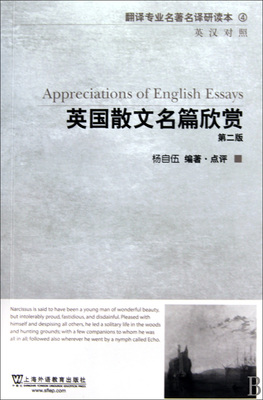
Among the farthestHebrides.啼声划破了海上的岑寂?
Will no one tell me what she sings?— 谁能告诉我她唱些什么?
Perhaps the plaintive numbersflow也许这凄婉的歌声是咏叹
For old, unhappy, far-offthings,古老的、遥远的悲欢离合,
And battles longago;往昔年代的征战?
Or is it some more humblelay,要么是一支平凡的曲子,
Familiar matter oftoday?唱的是当今的寻常琐事?
Some natural sorrow, loss, orpain,常见的痛苦,失意,忧伤,
That has been, and may beagain?历来是如此,今后也一样?
Whate’er the theme, the Maidensang这姑娘,不论唱的是什么,
As if her song could have noending;仿佛能唱个没完没了;
I saw her singing at herwork,只见她一边唱、一边干活,
And o’er the sickle bending;—弯腰挥动着镰刀;—
I listen’d , motionless andstill;我一动不动,悄悄听着;
And, as I mounted up thehill,直到我缓步登上山坡,
The music in my heart Ibore,那歌调早已寂无声响,
Long after it was heard nomore.却还在心底悠悠回荡。
汉译英部分
以下诗篇译者:王知还
(16)咏史(之二)OnHistory
左思Zuo Si
郁郁涧底松,Luxuriantgrow pine trees in the deepravine;
离离山上苗, Onhilltops are saplings, few and far between.
以彼径寸茎, Yethow the inch-thick stems do cast their shade
荫此百尺条。Athwart the tall trunks of a higher grade!
世胄蹑高位, Thetitled heirs are highly placed in power,
英俊沉下僚。 Thecream of talent sink down lower and lower.
地势使之然, Theactual terrain’s ordained it this way,
由来非一朝。 It’s othe fashion not only of a day!
(17)春夜喜雨The Good RainOf A Spring Night
杜甫DuFu
好雨知时节, Thegood rain knows its proper time —
当春乃发生。 Itcomes when Spring’s in full array,
随风潜入夜,Stealingwith the wind into the night,
润物细无声。Tomoisten things or permeate,
In such a coy and noiseless way.
夜径云俱黑, O’ erall the paths and fields around,
江船火独明。Theblack clouds form a glowing Sight,
Brightness being seen only on the river boats.
晓看红湿处, Atdawn, where wet patches of red
花重锦官城。 Are, Ifind the City of Brocade1
Resplendent with flowers dewily-weighed.
Note: 1. An ancient small suburb town west of Chengdu, SichuanProvince. The beautiful brocade produced in this ancient town usedto be washed in a crystal-clear river nearby, hence the name —Brocade City.
(18) 赋得古草原送别 Farewell On The Prairie
白居易BaiJuyi
离离原上草,Lush grass grows on the expansive plain;
一岁一枯荣。Each year it dries up, then it thrives again.
野火烧不尽,The prairie fires cannot burn it out,
春风吹又生。Once spring breeze blows, it’s back and all about,
远方侵古道,Extending far, invading ancient roads,
晴翠接荒城。Its bright emerald reaching ruined abodes.
又送王孙去,It’s seeing a wanderer off once more,
萋萋满别情。Full of parting melancholy, as of yore. (before)
Note
Bai Juyi (772-846) was an important poet of the “middle period” ofthe Tang Dynasty. His life spanned the reign of 6 emperors — aperiod marked, on the whole, by political deterioration, usurpationof power by eunuchs and intensified exploitation of the peasants.First as a low-ranking local official and then as an“advisor-admonisher” in the imperial court, still later demoted tolocal administrative posts, Bai Juyi was torn between his naturalsympathy for the people’s sufferings and conformity withofficialdom required of him. The best of his poetry expresses theformer to good effect.
(19)陋室铭Inscription For My ShabbyHut
刘禹锡LiuYuxi
山不在高,Mountains need not always be high,
有仙则名。 They’refamed if therein fairies abide.
水不在深, Watersneed not always be deep,
有龙则灵。 They’rehallowed1 where dragons are spied2.
斯是陋室, This isa simple, mean abode,
惟吾德馨。 Only myvirtue lends it fragrance.
苔痕上阶绿, Moss smears a fringe of green upon
The stone steps forming the terrace;
草色入帘青。 And peering through the screen, therethrobs
The emerald of the lush grass.
谈笑有鸿儒, Great scholars drop in casually,
And talk and laugh in abandoned ways;
往来无白丁。 While in this cordial company
Nonentities have ne’er a place.
可以调素琴, The ancient zither we might play,
阅金经。Or golden-lettered scriptures[2] peruse.
无丝竹之乱耳,No concert bands our ears confuse,
无案牍之劳形。And no official files await Our tackling — to excruciate.(使剧痛的)
南阳诸葛庐, To Zhuge’s cottage at Nanyang,
西蜀子云亭。 Or Ziyun’s pavilion in Sichuan, mine maywell be compared.
孔子云:So,as Confucius once had said,
“何陋之有?”“How could it be considered mean?”
1.神圣的;2. discovered
Notes
1.The Chinese character “ming” (铭)originallymeans an inscription on a metal slab or an engraving on asacrificial utensil. Later it became the name of a particularliterary genre.
2.Some rare Buddhist Scriptures were written withgold powder mixed with gelatin on dark surfaces.
3.One of the best known great statesmen andmilitary geniuses in Chinese history, Zhuge Liang (A.D. 181-243),helped Liu Bei (A.D. 161- 223) found one of the Three Kingdoms —the Shu Kingdom at the end of the Han Dynasty. Before he waspersistently sought out and made prime minister by Liu Bei, he hadlived in retirement in a simple cottage in Nanyang, now west ofXiangyang, Hubei Province.
4.Ziyun is another name of Yang Xiong (53 B.C. —A.D. 18), a great scholar of the West Han Dynasty. For a long timehe had confined himself to his simple lodgings in Chengdu, Sichuan,writing an erudite book.
The quotation is from The Analects of Confucius. Once whenConfucius became unpopular and slighted, he said he would go andsettle down in some far-away minority region. Someone suggestedthat the place would be too shabby and mean to live in, Confuciusreplied: “when inhabited by a (righteous) gentleman, how could itbe considered mean?”
(20)
水调歌头·中秋感怀RuminationsOn The Mid-autumn Festival
苏轼SuShi
(ToMy Brother Ziyiu)
(Tune:“Prelude To The Water Melody”)
明月几时有?Obrilliant Moon, since when have you been there?
把酒问青天。—Raisingmy cup of wine, of Heaven I inquire,
不知天上宫阙,Wondering: at the celestial palace, to what year
今夕是何年?Doesthis evening of ours correspond?
我欲乘风归去,Iwould so Like to go
又恐琼楼玉宇,Astridea wisp of wind, but fear
高处不胜寒。Atthat height, where the snow-and-ice palace is,
The cold would be too much to stand.
起舞弄清影,Yet rising to dance, enjoying my
何似在人间!shadow’slyric cadences,
Being on earth still seems without compare.
转朱阁,Aroundred gables, into latticed
低绮户,windowspeering low,
照无眠。Themoon many a sleepless man would find.
不应有恨,Oh,no grudge you bear us (isn’t that so?),
何事偏向别时圆?Then why, when we’ve our dear ones left behind,
Should you be so enviably full?
人有悲欢离合,OMan has his joys and sorrows,
partings and reunions,
月有阴晴圆缺,Asthe moon will fill out or wane,
The weather change from fine to rain;
此事古难全。Through the ages, that has ne’erbeen all perfectand well.
但愿人长久,Letus pray
Thatwe all may
Belong hearty-and-hale;
千里共婵娟。Thougha thousand miles apart, we’ll fare
Well,and of this lunar beauty share.
Compare several versions of the first two sentences:
Version 1
Brightmoon, when was your birth?
Winecupin hand, I ask the deep blue sky;
——杨宪益,戴乃迭译
Version 2
Howlong will the full moon appear?
Winecup in hand, I ask the sky.
——许渊冲译
Version 3
Howrare the moon, so round and clear!
Winecup in hand, I ask of the blue sky.
——林语堂译
Version 4
“Whenshall we have a bright moon?”
Holdingup a wine cup I queried the Blue Heaven.
——龚景浩译
Notes
1. Su Shi (1036-1101) was the great Song Dynasty poet, essayist,calligrapher and painter. Even during his lifetime, his works werewidely acclaimed and coveted. Some were block-printed by friends orcarved on stone tablets. A few trickled into Korea and Japan whereSu Shi has, to this day, many admirers. His two most popular fu(descriptive prose interspersed with verse) are included inJapanese middle-school text books.
2. This poem was written on the Mid-Autumn Festival of 1076, whenSu Shi was ousted from the capital Loyang as a political dissidentand demoted to a local administrator, to Mizhou, now Zucheng Countyin Shandong Province. He had been severed from his brother Ziyiu,also a famous writer, for seven years, which fact, together withthe chagrin caused by his political failure, accounts for a hint ofsadness and a universal concern in this famous lyric.
(21)饮湖上初晴后雨ToWest Lake, Hangzhou
苏轼SuShi
水光潋滟晴方好,Whensunny, with its waters glittering, full,
In beauty consummate appears the lake;
山色空蒙雨亦奇。When it rains, under an ethereal veil,
The hills exude a glamour all unique.
欲把西湖比西子,O, West Lake! Could it be apt to compare
Thee to peerless Xizi — “Maid of the West” —
淡妆浓抹总相宜。Whowas always, invariably fair
With or without make-up, however drest?
(22)满江红·怒发冲冠HairOn End (Tune: “The River All Red”)
岳飞Yue Fei
怒发冲冠,Hairon end and shoving my hat,
凭栏处,Inwrath I lean on th’balustrade,
潇潇雨歇。Whileth’ rain leaves off its pitter-pat.
抬望眼,Eyesfixed skyward,
仰天长啸,Isigh long and loud.
壮怀激烈。Ahero’s fury fills mybreast,
三十功名尘与土,At thirty, nothing achieved,unknown,
—but these to me are light as dust
八千里路云和月。—I’vefought through eight-thousand li
Holdingthe field, under cloud and moon.
莫等闲,WhatI do mind, is not tolet
白了少年头,My young head turn white in vain,
空悲切!Andbe gnawed by empty sorrow then.
靖康耻,Withthe Jingkang Humiliation2 yet
犹未雪,Unavenged,unredressed,
臣子恨,Howcan a subject’s grievance be
何时灭!Evereffaced from memory?
驾长车踏破,I’ll send war-chariots rough-shod
贺兰山缺。Throughthe gorges of Mt. Helan;
壮志肌餐胡虏肉,Toquench my thirst,
笑谈渴饮匈奴血。I’ddrink theblood
OfHuns, while laugh and chat I can;
Heroic-minded, to satiatehunger,
I would make Tartars’ flesh my fare.
待从头,’Tilour lost land is all retrieved,
收拾旧山河,Thento the Imperial Palace, there
朝天阙!I’llmake obeisance*, relieved!
Notes
1. Yue Fei (1103-1141) is among the most revered and commemoratednational heroes in Chinese history. He is chiefly remembered forhis unswerving, staunch and successful resistance of the Jin (theNǚ Zhen nationality) invasions and his tragic end — murdered forhis very merits. But what is handed down of his poetry can hold itsown in the history of Chinese literature, as seen in the instanceof this poem.
2. The Jingkang Humiliation refers to the capture of the twoemperors Qinzong and Huizong by the Jin invaders in 1127.
(23)示儿ToMySon
陆游LuYou
死去原知万事空,That after death everything
Becomesvoid, I sure perceive;
但悲不见九州同。Yet, not to have seen my country
Unified is still what makes me grieve.
王师北定中原日,When the King’s northward-boundArmy
The Central Plains does reaquire,
家祭无忘告乃翁。In your ancestral sacrifices
Forgetnot to tell your sire!
(24)竹石BambooGrowing Out Of A Rock
郑燮ZhengXie
咬定青山不放松,Tenaciously,biting the blue hill,
Never letting go,
立根原在破岩中。 Its roots are sunkthrough thedeep crack
Of a broken rock.
千磨万击还坚劲,Wearand tear, blow after blow,
Find it firm and tough still,
任尔东西南北风。Regardlessof every wind’s wrath,
Fromthe east, west, south or north.
Note
Zheng Xie (1693-1765) was a prominent painter, calligrapher andpoet, and one of the “Eight Eccentrics of Yangzhou” in the QingDynasty. A man of great integrity, he scorned the corrupt practicesof officialdom, always sympathizing with the people’s sufferings.He had served as Chief Magistrate of Fan-County (范县) andWei-County(潍县)in Shandong Province. After retirement he made aliving by selling his paintings and works of calligraphy.
(25)己亥杂诗MiscellaneousPoems Written in 1839 2
龚自珍GongZizhen
(二)(II)
九州生气恃风雷,Oncyclonic storms the vitality
Of our native Nine States3 depends;
万马齐喑究可哀。Whenhordes of horses all mute stay,
A sadness on the spirit descends.
我劝天公重抖擞,Iwould advise the Lord of Heaven
His great initiative to renew,
不拘一格降人材。Andgive us men of genius, even
Men that accepted mores outgrow.
Notes
1. Gong Zizhen (1792-1841), from Zhejiang Province, became a6th-grade official during the reign of Qing Xuanzong (1821-1850).He is best known as a progressive thinker, scholar and poet, and aprotagonist of reform and change. Patriotic fervour throbs in thebest of his poetry.
Miscellaneous Poems Written in 1839, from which one is selectedhere, were composed soon after Gong resigned from his post. He hadlong resented the corruption and incompetence of the Qinggovernment, yet he still hoped for the best in regard to thewelfare of the people, as is evident in these poems.
2. This was written as the poet, on his way home from the capital,passed Zhenjiang, Jiangsu Province, were the people were just thenholding a sacrificial ceremony for the god of thunder and rain.This became an apt opportunity for him to express his suppressedpolitical sentiments apparent in the lines.
3. From the earliest recorded Chinese history, China was dividedinto nine states. The names differ in various books of differentperiods. But it has become customary to refer to China as “The NineStates”.
(26)为了忘却的纪念Commemoration,In Order To Forget2
鲁迅LuXun1
惯于长夜渡春时,Inuredto pass my prized springtime
In such long, long nights and dead,
挈妇将雏鬓有丝。I take with me my wife and child,
Whilewith silver my temples’re shed.
梦里依稀慈母泪,In a late dream I dimly find
My kind, dear mother’s face in tears,
城头变幻大王旗。When o’er the city gate the chieftain’s
Each signal flag in turnappears3.
忍看朋辈成新鬼,AndO, how could I bear to see
Mylate friends turned to new ghosts,
怒向刀丛觅小诗。Andmyself, in anger, only seek
Smallpoems in groves of bayonets!
吟罢低眉无写处,But, having sung, I lower my brow,
—Can find nowhere to write it down,
月光如水照缁衣。Withonly the white moonlight around,
Awash over my black silk gown.
Notes
1.Lu Xun (1881-1936) is the most important great thinker, writerand revolutionary of modern China, regarded as an “unprecedentednational hero” by Mao Zedong. Lu Xun’s excellent stories andmilitant essays have been widely translated into foreign languagesand become a part of the cultural heritage of the world.
2.In January, 1931, five leftist writers — Rou Shi, Li Weisen, HuYeping, Yin Fu and Feng Keng were arrested and soon executed by theKuomintang government. Lu Xun was shocked and indignant, and wrotethis poem in commemoration of the martyrs.
Referring to Jiang Jieshi’s evil doings worked out inNanjing.
(27)无题(赠日本友人)ToA Japanese Friend, 1932
鲁迅LuXun
血沃中原肥劲草,Whereblood has fattened the CentralPlain,
Theretough grass is shooting up again.
寒凝大地发春华。Thoughthe land’s hard-frozenby thecold,
Ye spring flowers will still unfold.
英雄多故谋夫病,Theheroes are playing many a gimmick, 1
While schemers proclaim themselves sick; 2
泪洒崇陵噪暮鸦。Andat Sun’s Mausoleum sad tears are shed,3
Where homing ravens crow, ready for bed.
Notes
1 and 2. “Heroes” and “schemers” refer to Jiang Jieshi and WangJingwei and their political lackeys. The chief schemers were HuHanmin and Wang Jingwei, who at the time declared themselves illand were actually instigating a division of the K.M.T.
3. Sun Yat-sen’s son, Sun Ke, was then being ousted from his postin the Administrative Yuan, and he went and had a good cry at hisfather’s Mausoleum outside of Nanking.
(28)自嘲SelfDerision (Oct.1932)
鲁迅LuXun
运交华盖欲何求,Towhat could I aspire, ill-starred as I am?
未敢翻身已碰头。Erethe tables are turned, I’ve knocked my head!
破帽遮颜过闹市,Ashabby hat shading my face,
Iglide about downtown;
漏船载酒泛中流。Takingwine in a leaky boat,
Yet I stay firm in midstream1.
横眉冷对千夫指,Confrontingthe potentates’reproof, (君主,统治者)
I keep a cold, fierce frown;
俯首甘为孺子牛。But,or-like, bowing my head,
I’llwillingly serve a child.
躲进小楼成一统,Myself’sown master, inside
My small flat I shall hide,
管他冬夏与春秋。Whetherit be winter, summer,
Autumn, or spring in the wild!
Note
1. The Chinese proverb “a pillar in midstream” implies someone whostays firm as a rock in turbulent times.
(29)沁园春·长沙Changsha*(Tune: “Spring In A Pleasure Garden”)
毛泽东MaoZedong
独立寒秋,Alone,erect, in the autumn cold,
湘江北去,Atthe tip of Isle of Orange I stand,
橘子洲头。Whilethe Xiang River northward flows.
看万山红遍,Lo!All the thousand hills shinered,
层林尽染;Eachlayer of the forest’s richly dyed.
漫江碧透,Theentire stream is sheeremerald,
百舸争流。Where scores of junks, competing, speed.
鹰击长空,Theeagle hurls itself against
Thespacious sky;
鱼翔浅底,Whilefish fly o’er the shallowriverbed.
万类霜天竞自由。Allforms of life, in the frosty air,
For freedom vie.
怅寥廓,Movedby the vastness of it all,
问苍茫大地,I ask the boundless Earth: In whose
谁主沉浮?Handsrests the fate to rise orfall?
携来百侣曾游。Iused to take some scores of friends
This scenic spot to see.
忆往昔峥嵘岁月绸。How crowded are the eventful years
That are wont to flee!
恰同学少年,Just adolescent schoolboys, all
风华正茂;Oftalent blooming to full prime,
书生意气,With scholars’ verve we were headstrong,
挥斥方遒。Denouncing state affairs of the time,
指点江山,Or writing essays pro andcon.
激扬文字,Lordsof ten-thousand-householdfiefs
粪土当年万户侯。Of yore, seemed mere dungdust to us.
曾记否,Remember?— swimming midstream once,
到中流击水,
浪遏飞舟?We struck waves to halt the fleeting skiffs ?
Note
* Changsha, the capital of Hunan Province. Young Mao Zedong wentthere to study at the First Normal School from 1914 to 1918.
(30)沁园春·雪Snow (Tune:“Spring I A PleasureGarden”)
毛泽东MaoZedong
北国风光,A northern landscape comes into view:
千里冰封,O’er a thousand miles — ice fetters all,
万里雪飘。O’er ten thousand miles — snowflakes alight.
望长城内外,Lo! In- and out-side the Great Wall —
惟余莽莽;— An exclusive, vast expanse of white;
大河上下,And up and down the Yellow River,
顿失滔滔。Of a sudden’s ceased the mighty flow.
山舞银蛇,Like silver snakes the mountains roll,
原驰蜡象,And plateaus race like wax elephants,
欲与天公试比高。Aspiring to vie withHeaven’s height.
须晴日,It takes a clear, fine day to get
看红装素裹,The snow-wrapped beauty of it all,
分外妖娆。And feel how superbly it enchants.
江山如此多娇,Mycountry lies so full of charms
引无数英雄竞折腰。That innumerable heroes have sped
Tomake obeisance at her call.
惜秦皇汉武,A pity! — the Emperor of Qin
略输文采;AndWudi of Han1 somehow lacked
Refinement, verse and elegance,
唐宗宋祖,AndTangzong and Songzu2, too, smacked
稍逊风骚。Ofwant of cultural excellence;
一代天骄,AndGenghis Khan3, the Heaven-sent,
成吉思汗,Pride of his time, knew but to bend
只识弯弓射大雕。His bow at gianteagles on high.
俱往矣,Butall these have passed away;
数风流人物,For great accomplished men, let’s syp
还看今朝。Among those acting pat today.
Notes
1. Emperor of Qin — Ying Zheng (159-210 B.C.), was the founder ofthe first centralized feudal empire in China, after vanquishing oneby one the other six of the Warring Nations.
Emperor Wu of Han — Liu Che (156-87 B.C.), whose reign marked thepeak of the Former Han Dynasty’s military might, politicalrenovation, economic prosperity and cultural achievements.
2. Tangzong is the abbreviation of Tang Taizong Li Shimin (A.D.599-649). During his reign there was unprecedented development ofsocial productivity, political stability and relatively peacefulrelations with the border minority tribes.
Songzu—abbreviation of Song Taizu Zhao Kuangyin (A.D.927—976),founder of the Song Dynasty which put an end to more than50 years of bloody strife during the Five Dynasties.
3. Genghis Khan (1162-1227), founder of the largest empire inChinese history, who first unified his Mongolian tribes beforeconquering the whole of China and then regions as far as Asia Minorand southern Russia.
Additional Poems
(1) 七律 长征
一九三五年十月
红军不怕远征难, 万水千山只等闲。
五岭逶迤腾细浪, 乌蒙磅礴走泥丸。
金沙水排云崖暖, 大渡桥横铁索寒。
更喜岷山千里雪, 三军过后尽开颜。
The Long March
——AQilǜ Poem
The Red Army fears not the trials of the Long March,
Holding light ten thousand crags and torrents.
The Five Ridges wind like gentle ripples
And the majestic Wumeng roll by, globules of clay.
Warm the steep cliffs lapped by the waters of Golden Sand,
Cold the iron chains spanning the Tatu River.
Minshan's thousand li of snow joyously crossed,
The three Armies march on, each face glowing.
(2)念奴娇 昆仑
一九三五年十月
横空出世,莽昆仑,阅尽人间春色。
飞起玉龙三百万,*搅得周天寒彻。
夏日消溶,江河横溢,人或为鱼鳖。
千秋功罪,谁人曾与评说?
而今我谓昆仑,不要这高,不要这多雪。
安得倚天抽宝剑,把汝裁为三截?
一截遗欧,一截赠美,一截还东国。
太平世界,环球同此凉热。
*前人所谓“战罢玉龙三百万,败鳞残甲满天飞”,说的是飞雪。这里借用一句,说的是雪山。夏日登岷山远望,群山飞舞,一片皆白。老百姓说,当年孙行者过此,都是火焰山,就是他借了芭蕉扇扇灭了火,所以变白了。
Kunlun
——to the tune of Nian Nu Jiao
October 1935
Far above the earth, into the blue,
You, wild Kunlun, have seen
All that was fairest in the world of men.
Your three million white jade dragons in Flight
Freeze the sky with piercing cold.
In summer days your melting torrents
Flood the streams and rivers,
Turning men into fish and turtles.
Who has passed judgement on the good and ill
You have wrought these thousand autumns?
To Kunlun now I say,
Neither all your height
Nor all your snow is needed.
Could I but draw my sword o’ertopping heaven,
I’d cleave you in three:
One piece for Europe,
One for America,
One to keep in the East.
Peace would then reign over the world,
The same warmth and cold throughout the globe.
再别康桥 Saying Goodbye toCambridge Again
徐志摩(1896-1931),浙江海宁人。1920年曾留学英国。1923年加入新月社,成为新月社诗派的代表诗人。
轻轻的我走了,Very quietly I take my leave,
正如我轻轻的来; As quietly as I camehere;
我轻轻的招手,Quietly I wave goodbye
作别西天的云彩。 To the rosy clouds inthe western sky.
那河畔的金柳,The golden willows by the riverside
是夕阳中的新娘; Are young brides inthe setting sun;
波光里的艳影,Their reflections on the shimmering waves
在我的心头荡漾。 Always linger in thedepth of my heart.
软泥上的青荇,The floating heart growing in the sludge
油油的在水底招摇; Sways leisurely under the water,
在康桥的柔波里, In the gentle waves ofCambridge,
我甘做一条水草! I would be a waterplant!
那榆荫下的一潭, That pool under theshade of elm trees
不是清泉,是天上虹;Holds not water but the rainbow from the sky;
揉碎在浮藻间,Shattered to pieces among the duck weeds
沉淀着彩虹似的梦。 Is the sediment of a rainbow-like dream.
寻梦?撑一支长篙, To seek a dream?
Justto pole a boat upstream
向青草更青处漫溯; To where the green grass is more verdant;
满载一船星辉,Or to have the boat fully loaded with starlight
在星辉斓里放歌。 And sing aloud in thesplendour of starlight.
但是我不能放歌, But I cannot singaloud:
悄悄是别离的笙萧; Quietness is my farewell music;
夏虫也为我沉默, Even summer insectskeep silence for me;
沉默是今晚的康桥! Silent is Cambridge tonight!
悄悄我走了,Very quietly I take my leave,
正如我悄悄的来;Asquietly as I came here;
我挥一挥衣袖,Gently I flick my sleeves,
不带走一片云彩。 Not even a wisp ofcloud will I bring away.
 爱华网
爱华网